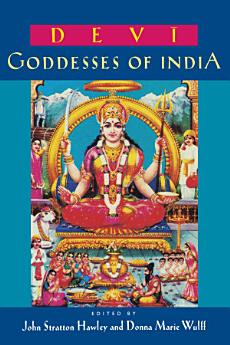Devi: Goddesses of India
John Stratton Hawley · Donna Marie Wulff
জুলাই ২০২৩ · Comparative Studies in Religion and Society কিতাপ 7 · Univ of California Press
ইবুক
373
পৃষ্ঠা
family_home
যোগ্য
info
reportমূল্যাংকন আৰু পৰ্যালোচনা সত্যাপন কৰা হোৱা নাই অধিক জানক
shoppingmode৬ ফেব্ৰুত দামত 32% ৰেহাই
এই ইবুকখনৰ বিষয়ে
The monotheistic religions of Judaism, Christianity, and Islam have severely limited the portrayal of the divine as feminine. But in Hinduism "God" very often means "Goddess." This extraordinary collection explores twelve different Hindu goddesses, all of whom are in some way related to Devi, the Great Goddess. They range from the liquid goddess-energy of the River Ganges to the possessing, entrancing heat of Bhagavati and Seranvali. They are local, like Vindhyavasini, and global, like Kali; ancient, like Saranyu, and modern, like "Mother India." The collection combines analysis of texts with intensive fieldwork, allowing the reader to see how goddesses are worshiped in everyday life. In these compelling essays, the divine feminine in Hinduism is revealed as never before—fascinating, contradictory, powerful.
The monotheistic religions of Judaism, Christianity, and Islam have severely limited the portrayal of the divine as feminine. But in Hinduism "God" very often means "Goddess." This extraordinary collection explores twelve different Hindu goddesses, all of
The monotheistic religions of Judaism, Christianity, and Islam have severely limited the portrayal of the divine as feminine. But in Hinduism "God" very often means "Goddess." This extraordinary collection explores twelve different Hindu goddesses, all of
লিখকৰ বিষয়ে
John S. Hawley is Professor of Religion at Barnard College and Director of the the National Resource Center for South Asia at Columbia University. Donna M. Wulff is Professor of Religion at Brown University. Together they edited The Divine Consort: Radha and the Goddesses of India (1986).
এই ইবুকখনক মূল্যাংকন কৰক
আমাক আপোনাৰ মতামত জনাওক।
পঢ়াৰ নির্দেশাৱলী
স্মাৰ্টফ’ন আৰু টেবলেট
Android আৰু iPad/iPhoneৰ বাবে Google Play Books এপটো ইনষ্টল কৰক। ই স্বয়ংক্রিয়ভাৱে আপোনাৰ একাউণ্টৰ সৈতে ছিংক হয় আৰু আপুনি য'তে নাথাকক ত'তেই কোনো অডিঅ'বুক অনলাইন বা অফলাইনত শুনিবলৈ সুবিধা দিয়ে।
লেপটপ আৰু কম্পিউটাৰ
আপুনি কম্পিউটাৰৰ ৱেব ব্রাউজাৰ ব্যৱহাৰ কৰি Google Playত কিনা অডিঅ'বুকসমূহ শুনিব পাৰে।
ই-ৰীডাৰ আৰু অন্য ডিভাইচ
Kobo eReadersৰ দৰে ই-চিয়াঁহীৰ ডিভাইচসমূহত পঢ়িবলৈ, আপুনি এটা ফাইল ডাউনল’ড কৰি সেইটো আপোনাৰ ডিভাইচলৈ স্থানান্তৰণ কৰিব লাগিব। সমৰ্থিত ই-ৰিডাৰলৈ ফাইলটো কেনেকৈ স্থানান্তৰ কৰিব জানিবলৈ সহায় কেন্দ্ৰত থকা সবিশেষ নিৰ্দেশাৱলী চাওক।








